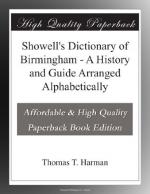1868, November.—This was the first election after the passing of the Reform Bill of 1867, by which Birmingham became entitled to send three members to the House of Commons; and as the Bill contained a proviso (generally known as the “minority clause”) that each voter should be limited to giving his support to two only of the candidates, an immense amount of interest was taken in the interest that ensued. The Conservatives brought forward Mr. Sampson S. Lloyd and Mr. Sebastian Evans, the Liberal Association nominating Messrs. John Bright, George Dixon, and Philip Henry Muntz (brother to the old member G.F. Muntz). The election has become historical from the cleverly-manipulated scheme devised by the Liberal Association, and the strict enforcement of their “vote-as-you’re-told” policy, by which, abnegating all personal freedom or choice in the matter the electors under the influence of the Association were moved at the will of the chiefs of their party. That the new tactics were successful is shown by the returns:—
George Dixon .. .. .. 15,188 }
P.H. Muntz .. .. .. 14,614 }Returned.
John Bright .. .. .. 14,601 }
S.S. Lloyd .. .. .. 8,700
S. Evans .. .. .. 7,061
1868, Dec. 21.—Mr. Bright having been appointed President of the Board of Trade, was re-elected without opposition. He held office till the close of 1870, but for a long time was absent from Parliament through illness.
1873, Aug. 6.—Mr. John Jaffray, one of the proprietors of the Daily Post, contested East Staffordshire against Mr. Allsopp, but he only obtained 2,893 votes, as against Mr. Allsopp’s 3,630.
1873, Oct. 18.—Soon after recovery of health Mr. Bright returned to his seat, and being appointed to the office of the Chancellor of the Duchy of Lancaster, was re-elected in due course.
1874, Jan. 30.—No opposition was made to the re-election of Messrs. Bright, Dixon, and Muntz.
1876, June 27.—Mr. Joseph Chamberlain was elected without opposition on the resignation of Mr. Dixon.
1880, March 31.—Though free from all the rioting and possible bloodshed that would have attended such an occasion a hundred years ago, the election of 1880 was the most exciting and hardest-fought battle between the two great political parties of the town yet recorded in local history. The candidates were Messrs. John Bright, Joseph Chamberlain and Philip Henry Muntz, the previous members and nominees of the Liberal Association, and Major Burnaby and the Hon. A.C.G. Calthorpe, Conservatives. There were 139 polling stations, and no less than 47,776 out of the 63,398 persons whose names were on the register, recorded their votes under the protection of the Ballot Act of 1870, now first brought into use at a Parliamentary election. The usual courtesies (!) appertaining to political contests were indulged in to considerable extent, and personalities of all sorts much too freely bandied about, but the election altogether passed off in the most creditable manner. The returns of the polling stood thus—




